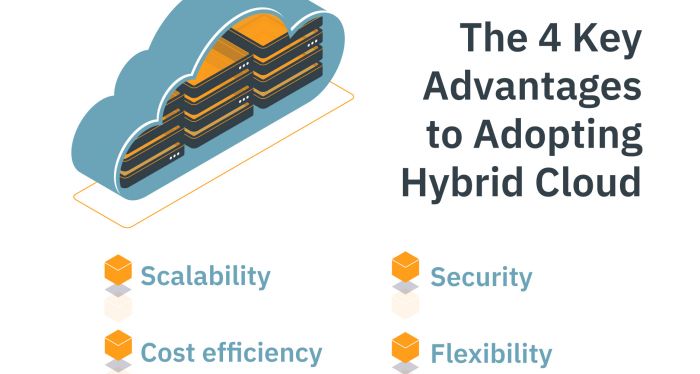The 4 key advantages to adopting a hybrid cloud system
Views, News & more

When it comes to choosing cloud solutions for a business or organisation, it can be tempting to pick and choose different aspects from different types of solutions to create a system that has the best combination of features.
This perhaps helps explain the rapidly increasing popularity of hybrid cloud systems among many businesses, who are looking to tap into the advantages offered by both private and public cloud services.
So, what is hybrid cloud? In a nutshell, it commonly refers to a system utilising a mix of private cloud services and public cloud services – such as Amazon Web Services (AWS), Google Cloud or Microsoft Azure – perhaps alongside on-premises infrastructure.
These different systems are used in conjunction, with the sharing of data and applications leading to orchestration and synergy between the different platforms.
So, what are the major reasons that businesses are turning to hybrid cloud systems? In this piece we examine 4 key advantages.
1 – Scalability
One of the core reasons companies migrate to a public cloud provider is the almost unlimited potential for scalability it provides.
The resources of the public cloud allow for huge scalability, both up and down, at a fraction of the cost it would take to invest in, build and expand an exclusively private network.
A hybrid cloud system allows companies to harness the expansiveness of the cloud to quickly and easily expand elements of their business.
This could include developing new applications, running more powerful programs or simply storing data in a way that is easier to handle and more efficient for business.
The scalability offered by adopting a public cloud service through a hybrid cloud system can be crucial in allowing companies to grow and compete at a rapid rate.
2 – Cost efficiency
A hybrid cloud system is a great option for an organisation looking to reduce their long-term IT costs, allowing them to combine the cost-saving elements of both private and public cloud services.
Firstly, storing some data in a private cloud managed by the organisation itself reduces some of the cost that would be incurred by migrating so much data to a public system.
It also curtails some of the subsequent potential costs, such as termination fees or the cost of migrating between providers, associated with a purely public cloud system.
On the other hand, as previously mentioned, utilising elements of a public cloud system allows for far more cost-effective scalability, compared with updating and growing a private network.
What’s more, using the public cloud can enable an organisation to reduce capital expenditure, as they are not required purchase the equipment needed to run their own data centres.
3 – Security
The protection of data is one of the most pressing issues facing almost all businesses in the modern marketplace.
While public cloud providers rightfully pride themselves on the efforts they put into protecting customer data, they are still more open targets for cyberattacks.
Using a hybrid cloud system allows companies to take advantage of the security, and perhaps more, the peace of mind that comes with a private cloud hosted behind a firewall.
Simply put, companies can increase their security with a hybrid cloud system by minimising the exposure of their data.
While individual companies are still targets, hosting some particularly sensitive data privately allows companies to put more complex encryption in place while statistically improving their security through methods such as the principle of least privilege.
4 – Flexibility
Perhaps a less tangible positive, flexibility is still an important advantage that businesses tap into when they adopt a hybrid cloud system.
This is largely the case as a hybrid operating system allows an organisation a greater degree of control, allowing them to customise the private end how they wish while entrusting the management of large amounts of data to a public operator.
Having the option of a public cloud can allow companies to very easily move non-sensitive data in order to improve the ease of operation of their private system, while at the same time benefiting from the flexibility offered by an easily, almost instantly, scalable public cloud.
But, most importantly, a hybrid cloud offers the overarching flexibility for an organisation to choose which solution, whether private or public, is best suited for each individual need.
The appeal of the hybrid cloud approach is probably best summed up with the cliché that it offers the best of both worlds. It allows companies to take advantage of the best things that both private and public clouds have to offer, with easy access to benefits such as scalability, combined with the ability to minimise the exposure of sensitive data.
Find out more about hSo Hybrid Cloud. Download the new free guide:
DOWNLOAD
Get in touch
020 7847 4510
We may process your personal information in order to send you information you request, measure and improve our marketing campaigns, and further our legitimate interests. For further details, see our privacy policy.
Contact us
-
- Head Office:
- hSo, 50 Leman Street, London, E1 8HQ
- Switchboard:
- 020 7847 4500
- Support (24x7):
- 0333 200 3337
- support@hso.co.uk
- Marketing & Sales:
- 020 7847 4510
- info@hso.co.uk


















